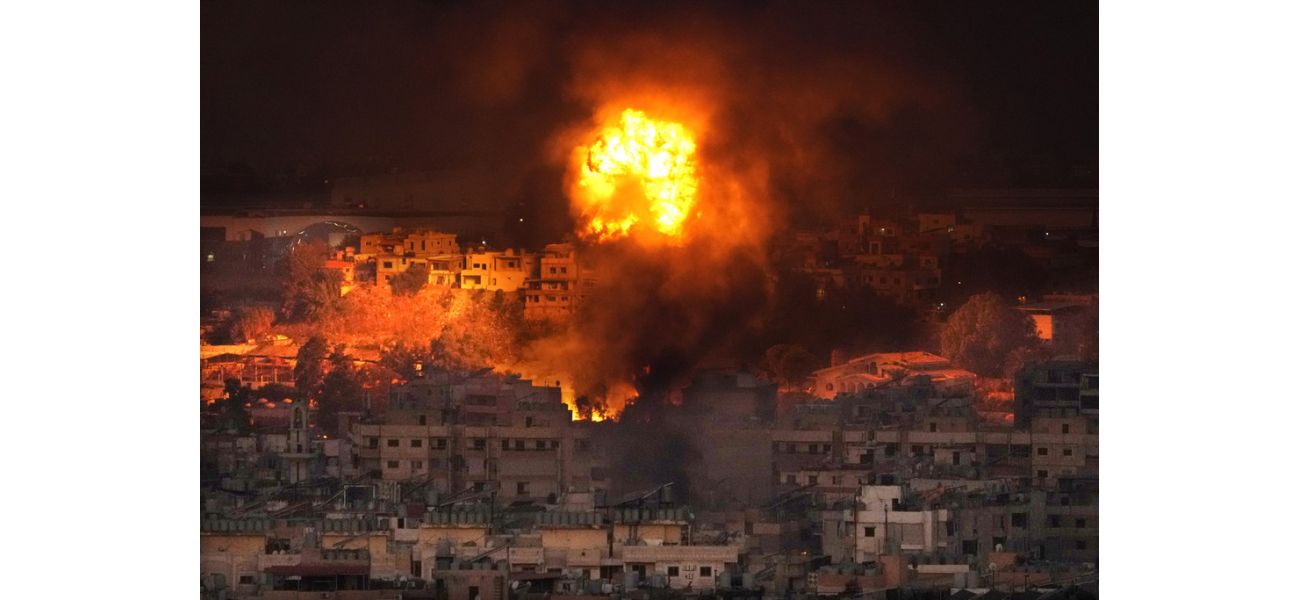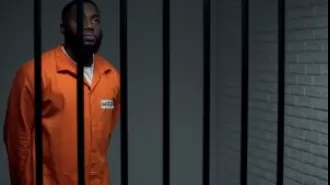Hezbollah leader killed in Israeli airstrike, confirmed by organization.
Hezbollah leader and founder Hassan Nasrallah killed in Israeli airstrike in Beirut, group confirms.
September 28th 2024.

In a tragic turn of events, Lebanon's Hezbollah group announced on Saturday that their leader and founder, Hassan Nasrallah, had been killed in an Israeli airstrike in Beirut the day before. With heavy hearts, they released a statement declaring that Nasrallah had joined the ranks of their fellow martyrs. In the midst of their grief, the group reaffirmed their commitment to their cause, vowing to continue the holy war against their enemy and to support Palestine.
Nasrallah, who had been at the helm of Hezbollah for over three decades, was the most powerful target to fall victim to Israeli attacks in the recent weeks of escalating conflict between the two sides. The Israeli military claimed responsibility for the precise airstrike that took place on Friday, targeting Hezbollah's leadership as they gathered at their headquarters in Dahiyeh, located in the southern part of Beirut.
Unfortunately, the airstrike also resulted in the destruction of six apartment buildings and caused the loss of six lives, while injuring 91 others. Among the casualties were Ali Karki, the commander of Hezbollah's Southern Front, and other prominent commanders of the group. According to the Israeli military, the decision to carry out the airstrike was based on years of tracking Nasrallah, along with real-time information that made it a viable operation.
When asked about the details of the airstrike, Lt. Col. Nadav Shoshani, an army spokesperson, declined to provide specifics but emphasized that Israel always takes measures to avoid civilian casualties and carefully plans each strike in coordination with intelligence and legal experts. He also mentioned that the strike had been aimed at targeting Hezbollah's capabilities, particularly their strategic weapons such as larger, guided missiles, in the hopes of deterring their attacks and bringing civilians back to their homes near the Lebanese border.
The Palestinian militant group Hamas, an ally of Hezbollah, also expressed their condolences for the loss of Nasrallah. They acknowledged the role he played in supporting their cause and the Palestinian people, and stated their belief that his passing would only strengthen the resolve of the resistance in Lebanon and Palestine.
Despite the loss of their leader, Israel's Chief of Staff, Lt. Gen. Herzi Halevi, made it clear that this was not the end of their efforts. He indicated that more strikes were planned, and the military would continue to put pressure on Hezbollah until they stop their attacks that have displaced tens of thousands of Israelis from their homes. The recent fighting has also caused the displacement of over 200,000 Lebanese civilians, according to the United Nations.
In response to the escalating tensions, the Israeli military has called upon additional reserve soldiers to mobilize and serve across the country. This comes after the deployment of two brigades to the northern part of the country earlier in the week, in preparation for a possible ground invasion.
While the Israeli military believes they have dealt significant damage to Hezbollah's capabilities, they acknowledge that much of their arsenal remains intact. Therefore, they will continue to target the group in the hopes of bringing an end to the ongoing conflict and allowing civilians to return to their homes. Lt. Col. Shoshani expressed their desire for a change in the current situation, which has resulted in the displacement of thousands of civilians and caused immense suffering on both sides.
In light of these events, Iran has called for support for Hezbollah, urging the international community to stand behind them in their fight against Israel. As tensions continue to rise, the future remains uncertain, and both sides must carefully consider their actions to avoid further loss of life and destruction.
The news broke on Saturday that the leader and founding member of Hezbollah, Hassan Nasrallah, had been killed in an Israeli airstrike in Beirut the previous day. A statement from the group confirmed the tragic loss, stating that Nasrallah had "joined his fellow martyrs." They also made a promise to continue their fight against the enemy and in support of Palestine.
Nasrallah, who had been at the helm of Hezbollah for over three decades, was by far the most significant target to be taken out by Israel during the recent weeks of heightened conflict between the two sides. According to reports, the Israeli military had carried out a precise airstrike on Friday while the Hezbollah leadership were holding a meeting at their headquarters in Dahiyeh, located in the southern part of Beirut.
The aftermath of the strike was devastating, with six people confirmed dead and 91 injured. The attack had leveled six apartment buildings, leaving behind a scene of destruction and chaos. The Israeli military stated that in addition to Nasrallah, Ali Karki, the commander of Hezbollah's Southern Front, and several other Hezbollah leaders had also been killed in the strike.
In a press conference, Lt. Col. Nadav Shoshani, an army spokesperson, explained that the decision to target Nasrallah had been based on years of tracking him, along with real-time information that made the operation feasible. When asked about the specifics of the airstrike and the number of civilian casualties, Shoshani declined to comment, saying that Israel always takes measures to avoid harming civilians and that all strikes are approved by intelligence and legal experts.
Upon hearing the news of Nasrallah's death, the Palestinian militant group Hamas issued a statement expressing their condolences to their ally, Hezbollah. Nasrallah had often referred to launching rockets at northern Israel as a "support front" for Hamas and the Palestinians in Gaza. The statement from Hamas also reassured that the resistance would continue, even in the face of such a significant loss, and that the assassinations would only strengthen their determination and resolve.
Meanwhile, Israel's Chief of Staff, Lt. Gen. Herzi Halevi, stated that the elimination of Nasrallah was "not the end of our toolbox," hinting that more strikes were on the horizon. It was unclear how Nasrallah's death would impact Hezbollah or the ongoing conflict between the two sides, which had been going on for almost a year now. Israel had made it clear that they would not back down until Hezbollah stopped their attacks, which had led to the displacement of tens of thousands of Israelis living near the Lebanese border. The recent fighting had also resulted in over 200,000 Lebanese being displaced, according to the United Nations.
To escalate their efforts, the Israeli military had called in additional reserve soldiers, mobilizing three battalions to serve across the country. This decision came after two brigades were sent to northern Israel earlier in the week to train for a possible ground invasion. Shoshani explained that their strikes over the past week had heavily damaged Hezbollah's capabilities, targeting both immediate threats and strategic weapons. However, he also acknowledged that much of Hezbollah's arsenal remained untouched and that Israel would continue to target the group.
"We hope this will bring about a change in Hezbollah's actions," Shoshani said, referring to the approximately 60,000 Israelis who had been evacuated from their homes along the Lebanese border for almost a year. The Israeli government had made it clear that stopping Hezbollah's attacks and allowing the residents to return to their homes was their primary goal in this war.
In the midst of all this turmoil, Iran, a close ally of Hezbollah, called for support for the group. They condemned the strike that had killed Nasrallah and urged the international community to stand with Hezbollah in their fight against Israel. The situation remained tense, with both sides showing no signs of backing down. It was a time of great uncertainty and fear for the people living in the region, with no end to the conflict in sight.
Nasrallah, who had been at the helm of Hezbollah for over three decades, was the most powerful target to fall victim to Israeli attacks in the recent weeks of escalating conflict between the two sides. The Israeli military claimed responsibility for the precise airstrike that took place on Friday, targeting Hezbollah's leadership as they gathered at their headquarters in Dahiyeh, located in the southern part of Beirut.
Unfortunately, the airstrike also resulted in the destruction of six apartment buildings and caused the loss of six lives, while injuring 91 others. Among the casualties were Ali Karki, the commander of Hezbollah's Southern Front, and other prominent commanders of the group. According to the Israeli military, the decision to carry out the airstrike was based on years of tracking Nasrallah, along with real-time information that made it a viable operation.
When asked about the details of the airstrike, Lt. Col. Nadav Shoshani, an army spokesperson, declined to provide specifics but emphasized that Israel always takes measures to avoid civilian casualties and carefully plans each strike in coordination with intelligence and legal experts. He also mentioned that the strike had been aimed at targeting Hezbollah's capabilities, particularly their strategic weapons such as larger, guided missiles, in the hopes of deterring their attacks and bringing civilians back to their homes near the Lebanese border.
The Palestinian militant group Hamas, an ally of Hezbollah, also expressed their condolences for the loss of Nasrallah. They acknowledged the role he played in supporting their cause and the Palestinian people, and stated their belief that his passing would only strengthen the resolve of the resistance in Lebanon and Palestine.
Despite the loss of their leader, Israel's Chief of Staff, Lt. Gen. Herzi Halevi, made it clear that this was not the end of their efforts. He indicated that more strikes were planned, and the military would continue to put pressure on Hezbollah until they stop their attacks that have displaced tens of thousands of Israelis from their homes. The recent fighting has also caused the displacement of over 200,000 Lebanese civilians, according to the United Nations.
In response to the escalating tensions, the Israeli military has called upon additional reserve soldiers to mobilize and serve across the country. This comes after the deployment of two brigades to the northern part of the country earlier in the week, in preparation for a possible ground invasion.
While the Israeli military believes they have dealt significant damage to Hezbollah's capabilities, they acknowledge that much of their arsenal remains intact. Therefore, they will continue to target the group in the hopes of bringing an end to the ongoing conflict and allowing civilians to return to their homes. Lt. Col. Shoshani expressed their desire for a change in the current situation, which has resulted in the displacement of thousands of civilians and caused immense suffering on both sides.
In light of these events, Iran has called for support for Hezbollah, urging the international community to stand behind them in their fight against Israel. As tensions continue to rise, the future remains uncertain, and both sides must carefully consider their actions to avoid further loss of life and destruction.
The news broke on Saturday that the leader and founding member of Hezbollah, Hassan Nasrallah, had been killed in an Israeli airstrike in Beirut the previous day. A statement from the group confirmed the tragic loss, stating that Nasrallah had "joined his fellow martyrs." They also made a promise to continue their fight against the enemy and in support of Palestine.
Nasrallah, who had been at the helm of Hezbollah for over three decades, was by far the most significant target to be taken out by Israel during the recent weeks of heightened conflict between the two sides. According to reports, the Israeli military had carried out a precise airstrike on Friday while the Hezbollah leadership were holding a meeting at their headquarters in Dahiyeh, located in the southern part of Beirut.
The aftermath of the strike was devastating, with six people confirmed dead and 91 injured. The attack had leveled six apartment buildings, leaving behind a scene of destruction and chaos. The Israeli military stated that in addition to Nasrallah, Ali Karki, the commander of Hezbollah's Southern Front, and several other Hezbollah leaders had also been killed in the strike.
In a press conference, Lt. Col. Nadav Shoshani, an army spokesperson, explained that the decision to target Nasrallah had been based on years of tracking him, along with real-time information that made the operation feasible. When asked about the specifics of the airstrike and the number of civilian casualties, Shoshani declined to comment, saying that Israel always takes measures to avoid harming civilians and that all strikes are approved by intelligence and legal experts.
Upon hearing the news of Nasrallah's death, the Palestinian militant group Hamas issued a statement expressing their condolences to their ally, Hezbollah. Nasrallah had often referred to launching rockets at northern Israel as a "support front" for Hamas and the Palestinians in Gaza. The statement from Hamas also reassured that the resistance would continue, even in the face of such a significant loss, and that the assassinations would only strengthen their determination and resolve.
Meanwhile, Israel's Chief of Staff, Lt. Gen. Herzi Halevi, stated that the elimination of Nasrallah was "not the end of our toolbox," hinting that more strikes were on the horizon. It was unclear how Nasrallah's death would impact Hezbollah or the ongoing conflict between the two sides, which had been going on for almost a year now. Israel had made it clear that they would not back down until Hezbollah stopped their attacks, which had led to the displacement of tens of thousands of Israelis living near the Lebanese border. The recent fighting had also resulted in over 200,000 Lebanese being displaced, according to the United Nations.
To escalate their efforts, the Israeli military had called in additional reserve soldiers, mobilizing three battalions to serve across the country. This decision came after two brigades were sent to northern Israel earlier in the week to train for a possible ground invasion. Shoshani explained that their strikes over the past week had heavily damaged Hezbollah's capabilities, targeting both immediate threats and strategic weapons. However, he also acknowledged that much of Hezbollah's arsenal remained untouched and that Israel would continue to target the group.
"We hope this will bring about a change in Hezbollah's actions," Shoshani said, referring to the approximately 60,000 Israelis who had been evacuated from their homes along the Lebanese border for almost a year. The Israeli government had made it clear that stopping Hezbollah's attacks and allowing the residents to return to their homes was their primary goal in this war.
In the midst of all this turmoil, Iran, a close ally of Hezbollah, called for support for the group. They condemned the strike that had killed Nasrallah and urged the international community to stand with Hezbollah in their fight against Israel. The situation remained tense, with both sides showing no signs of backing down. It was a time of great uncertainty and fear for the people living in the region, with no end to the conflict in sight.
[This article has been trending online recently and has been generated with AI. Your feed is customized.]
[Generative AI is experimental.]
0
0
Submit Comment





